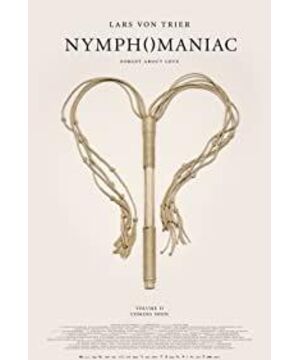There are definitely more than one angles of interpretation of the film, but it cannot be denied that the most distinctive and coherent theme of the film is feminism. I will analyze the feminist theme of the film through the analysis of three main characters: the heroine Joe, the single man Seligman, and the man Joe had loved Jerome.
The first thing to clarify is that the translation of female addicts is inappropriate for this film. The heroine Joe has clearly clarified in the film that she is not addicted but acting out of desire (see analysis below). Therefore, nymphomania should be translated as a female eroticism, which is more appropriate.
Joe
Joe is set to be an out-and-out female sexist. This is not only because of her precocious puberty (being aware of her vagina as early as 2 years old, and masturbating games at the age of six), not only her promiscuity and crazy desires, but also her 12-year-old full of mystery, A transcendental experience of self-climax like the transfiguration of Jesus. In this experience, she saw the illusion of two historical female eroticism-Messerina and the Babylonian prostitute. Therefore, the identity of a female sexist has a god-given quality for her, and she is proud and proud of her identity. This identity also determines her feminist characteristics.
Joe is also a complete feminist. Sex and the pursuit of sex are, to some extent, the embodiment of Joe's self-power. She consciously "has the ability of a woman to consciously hurt others", and at the same time frankly admits that her sex and eroticism are completely motivated by desire rather than demand. This shows that sex is a completely active process for her, practicing self-ability and even talent. Simultaneity is a tool for her to communicate. She perceives the world through her body and establishes an interpersonal framework. In this way, it is not difficult to understand that feelings are a shame for her. Because she said that love was uninvited, she felt ashamed of falling into love because in the process, she lost 100% of her previous control, she was manipulated and deprived of her power, and she was defeated.
Similarly, Joe disagrees that she is addicted to sex, because addiction is a state of being controlled and dominated, and she is an autonomous female erotica, and this outbreak on her is completely visible. At that time, she was persuaded and called herself a sex addict, and at the same time successfully led a sexless life for three weeks and five days. And just as she said "I'm the same as you" to other members, she saw the 12-year-old self-climaxing herself in the mirror, and began to realize her identity and realize that she was different from her. She rebukes others, either because she needs to prove her female identity through sexual intercourse, that is, she is not confident as a woman, or she is empty, and the instructor is all nonsense. She reached a deep level of awakening here, that is, this addiction withdrawal society is actually a siege of the moral constraints of the patriarchal society. The other female members of this association have become vassals of the patriarchal society and become the so-called morality. Guards, in order to get rid of her obscene thoughts, so that the bourgeoisie will not be so disgusting. She made an extremely feminist declaration: "I love my vagina and my filthy and obscene desires." This was a successful, politically charged feminist counterattack, and it was extremely great.
In fact, this feminist concept has long been reflected in her participation in the "Sex Club". This is also one of the most obvious feminist episodes in the movie. In this club, the female members chant the supremacy of vagina and give themselves the right to be pornographic and debauchery. Of course, the greatness lies not in this, but in their politically charged attempts to break through. They broke the windows of Valentine's Day for men and women, and opposed the mediocre and hypocritical love and so-called consumerism; they practiced it, making love with different men every time. But the result was tragic. They found that there were a large number of men and women kissing in the cinema. They were a minority surrounded by a hypocritical patriarchal world, and even the most determined members unfortunately fell. This is doomed to the failure of their breakthrough efforts.
This film is pessimistic about the future of feminists. Because, the failure like the above is seen repeatedly in the film. There is no denying that Joe has always been portrayed as a very brave and powerful woman-because of a bet with her husband, she stuffed a spoon into her vagina and dropped it when she stood up, ignoring the eyes of others; facing her husband’s plea for peace As a mother, she resolutely chose to abandon these constraints and pursue herself; she finally became a ruthless debt collector, possessing powerful psychological and physical strength; and facing the absurd farce of Mrs. H, she faced the first in life. She didn't feel any sin at all after a moral intervention, because it was the only way. But in the end, she was successfully influenced by the moral dogma from the patriarchal world. Throughout the film, she was in the present tense. She always said that she was a bad person and deeply blamed herself. She also expressed that she wanted to pursue a sexless life and give up all struggles. And she was finally betrayed again by her adopted daughter and same-sex lover, beaten and humiliated by peeing. At the same time, in the end, even the single virgin Seligman she trusted betrayed her and wanted to try. The film shows that the power of the patriarchal society is stubborn and huge, and it is pervasive. Feminists can only fight back if they want to survive. This is also doomed to permanent loneliness in their lives.
Of course, the fact that the film is pessimistic about the fate of feminists does not mean that it is passive and unsupportive of it. On the contrary, this pessimism comes from his full attention, understanding and sympathy for feminism. It praises Joe and regards him as a hero, as can be seen from the lonely and towering tree on the mountain. Moreover, the movie actually shows Joe's way of salvation-by gaining love and understanding. The film shows that this kind of love and understanding is difficult to obtain. In fact, to a certain extent, it is a kind of touch and appeal to the audience.
Seligman,
let's look at Seligman again. For this person's evaluation and understanding, the first and second parts must be combined, because the first part is quite misleading about Seligman's portrayal. I would like to understand Seligman as a typical type of male in a patriarchal society. They are knowledgeable and advocating rationality, but they continue to defend patriarchy by constructing various seemingly subtle theories, which is very hypocritical.
First of all, from the end of the second part, Seligman's first characteristic is hypocrisy. He keeps saying that he is a virgin, he is only interested in words, he will not listen to Joe's story with gender prejudice and colored glasses, and the performance of sexual indifference that can be seen everywhere is an illusion. These illusions were shattered by his last evil desire-wishing to have sex with Joe. It is worth noting that this hypocritical feature has long been reflected in the first part, that is, when Joe said he received a serious education, what Seligman imagined was the image of the obscene and absurd Joe as a teacher masturbating. Some people may have doubts, his identity as a virgin is too atypical. I think this is actually an enhanced treatment by the director, that is, an elderly virgin still cannot escape being a member of the male group that violates and harms women. This shows that the male power group is extremely sinful and the male hegemony penetrates extensively.
Seligman's second characteristic is his rational and analytical personality that is opposed to women, which is also typical of men. Joe follows the senses completely, she is sensitive, while Seligman is the opposite, maintaining a rational analysis from beginning to end (such as their understanding of cutting left and right fingernails). He is good at things that have long been dominated by men: fishing (almost no women enjoy fishing), mathematics (Fibonacci), music (Bach, Beethoven), religion (misogynistic Christianity), literature (Allen Poe, Thomasman), philosophy and psychoanalysis (Freud. Freud. Freud has a repressive saying that girls feel castrated because they find that they don’t have male genitalia.) This led to her negative, low self-esteem, and masochistic psychological tendencies, which is recognized as a manifestation of phallic worship). This is how the movie reflects the breadth and depth of the influence of patriarchy.
More importantly, because of this typical male character, Seligman kept digressing, and repeatedly couldn't grasp the main points of Joe's conversation, which made their conversation fragmented. Such examples can be seen everywhere. For example, when Joe talked about her humiliating experience of "first three and last five", Seligman got involved in the Fibonacci sequence, while Joe did not listen to him and continued to talk; for example, Seligman was talking about Bach. At that time, Joe looked around, completely disinterested. The most obvious is Joe's outburst: She thinks Seligman did not listen to her seriously, because when she talked about her most painful experience-no sexual feelings, Seligman's response was not comfort, concern, but talk about Aki. The stupid philosophical proposition of Luce and the tortoise. In this way, the film portrays the difference in thinking between men and women, showing a fundamental reason why it is difficult for women to get a true understanding of men.
At the same time Seligman is also a moral guardian. From time to time, he guided Joe to think about morals. For example, he said bluntly once again, "You are defending your own personality." When faced with Joe's indifferent to Mrs. H incident, he said "You are really stubborn" and so on. Regardless of whether these are conscious or unconscious, Seligman has shown the pseudo-ethics from the patriarchal society at least many times.
Jerome
Jerome's role analysis is relatively simple. He represents another male typical.
His main characteristics are weakness and incompetence, as well as the strong vanity and face-saving psychology that arises from it. He knows nothing about business. Facing a motorcycle that could not start, he was helpless; his assertion that he could not reverse was arbitrary and stupid. He also has the delicate and delicate bourgeoisie, which Joe thinks is feminine-to use a cake fork. Moreover, after the marriage, Joe couldn't be satisfied with asking her to go out to find someone absurdly, but on the one hand, because of this, he felt strong anger and shame in his heart. In the face of Joe's departure, he could do nothing, and in the end he could only rely on his children as a bargaining chip. In the end, due to self-enjoyment factors, they irresponsibly abandon their children.
In fact, such men account for the majority in reality. In the movie, Joe's father also has a certain degree of weakness and incompetence, because K is very distressed. The director here wants to show that the ability and greatness of men are quite limited, so the existence of male chauvinism is not in keeping with the facts, and women are not at all inferior to men by the slightest.
View more about Nymphomaniac: Vol. II reviews










